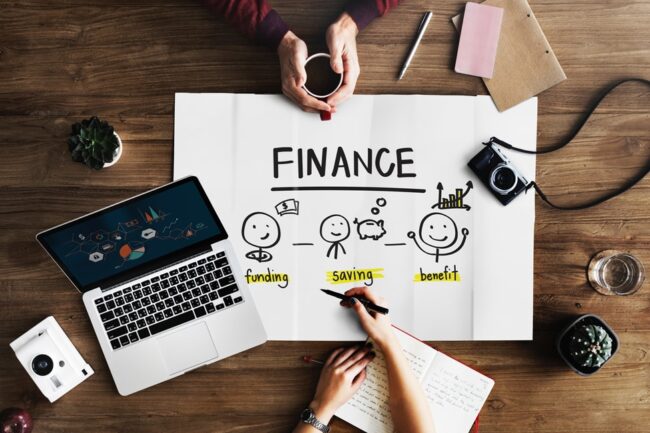Are you struggling with debt? Did you know getting out of a pile of credit card debts, auto, mortgage, and student loans, or any other is much easier than most people think? Your journey to a debt-free lifestyle begins with planning and financial education. It is a first step that most people are afraid to tackle.
Yet, planning can be as easy as taking a Saturday off and making a list of all your debts as you have your brunch. Likewise, check your credit report that are in collections. Next, know the interest rate, minimum payment, and due date for each debt. Seeing a full picture of what you owe helps you create a concrete plan. Here are more tips for coping with those:
1. Stop Borrowing Money

Shift your focus to living on a cash basis at least until you clear your debts.
2. Make a Budget and Stick to It
Allocate all your money before you get it. That way, you avoid guesswork or impulse buying when you get paid. Then, stick to the budget by doing the following: –
- Your spending should always be lower than your income
- Take time to think about big purchases before spending your cash on them
- Never spend what you do not have
- Opt for lower credit card limits
- Avoid accumulating fees on your monthly subscriptions
- Come up with a grocery list to plan for your meals. More so, never shop on an empty stomach.
- Cultivate a saving culture. Set up automatic transfers to your savings or investment accounts
- Buy in bulk for affordable prices
3. Create Realistic Debt Repayment Plans
Note that paying off all your debts takes time. And, underestimating your financial ability will only set you up for failure. Unless you hit a jackpot or receive an unexpected lump sum of money, they may never clear overnight. Then, be realistic when creating your repayment plan.
4. Make All Your Minimum Payments on Time

Paying your debts on time and in full helps you maintain a good credit score. So, what is the minimum repayment amount you need to make each month? Set up automatic payments for all your minimum credit obligations. Also, commit to paying more than the minimum to speed up getting out of debt and paying less overall. As a rule of thumb, pay at least double the amount of your minimum payment to any of your loans.
5. Renegotiate and Consolidate Debts
Trading one for another can help you organize yourself and become debt-free. You want to lump your bad balances and replace them with good ones. Or, you may use long-term debts to stretch out your revolving one. For example, you can use home equity loans to pay off a credit card debt. However, the consolidations, renegotiations, or transfers attract an upfront fee. Hence, exercise caution when using this strategy to become debt-free. The experts at www.Bills.com can advise you on a good consolidation plan.
6. Use Debt Relief Services

If you are in a vicious debt cycle that seems impossible to break, consider using relief services from a reputable organization. Ideally, a debt settlor negotiates with your creditors to accept lesser settlements for the bad debts. That way, you stop making payments to your creditors immediately. Also, you now have manageable monthly payments to the settlor, easing your financial obligations. Usually these are profit-making companies charging some fees for their debt relief services. Always look at the bigger picture before committing to a relief service.
7. Make Lifestyle Adjustments towards Debt Repayment
Know that debts are temporary financial challenges. Hence, even the slightest lifestyle adjustment you make now towards repaying them counts. These adjustments help you repay your debts even when on a low income. Here are some lifestyle adjustment tips for coping with debt: –
- If you use two or more cars for the family, share a ride in one vehicle or use public transport to cut on the cost of owning a car. More so, if you can ride a bike to your workplace, it will be good body exercise for you, minimizing your gym membership costs as well.
- Are you living alone in a spacious and expensive apartment? Get a roommate and cost-share the rent. Or, if you have spare space in your home, rent it out to generate additional cash to repay your debts. And, if both options are not viable for you, consider shifting to a smaller home. The move will free up more cash as you minimize your utility bills.
- How much does it cost you to maintain your social life? If portraying an expensive lifestyle on social media lands you in debt, start downsizing your spending. For example, reduce your night-outs with friends, opt for budget-friendly holiday destinations, and take advantage of deals at your favorite clothing store.
- Take debts that generate income. Likewise, minimize taking them towards a car, furniture, holiday, or any other non-income generating goals. And have an emergency fund to cushion you from unexpected spending.
- Get obsessed with clearing your debts. Use smartphone apps, spreadsheets, and any other tool at your disposal to keep track of your debts. Commit to and reward yourself for making small strides towards a loan-free life.
- Track your spending. Use spreadsheets, budget worksheets, money management apps, and banking app trackers to know where your hard-earned money goes.
8. Work With a Financial Advisor

Are you the kind of person who is rarely super-focused on your personal finances? Then, why not leave that work to the experts? See, engaging an experienced financial advisor can help you pinpoint loopholes in your spending that make you get into debt. This expert has foolproof strategies that ensure you pay your debt on time and sustains your lifestyle. Here are other benefits of working with a financial advisor: –
- You get adequate financial education to keep you debt-free
- It is objective advice that criticizes your past spending habits and money decisions
- A certified finance planner points out everything that impacts your financial situation. These include your tax returns obligations, installment loans, and credit card bills.
- The expert analyzes your debts to prioritize repaying delinquent accounts first.
Bottom Line
If you are staring at a pile of credit card debt or any other type that you don’t know how to tackle, you will need a concrete plan. With lots of tips for coping with debt, it may take trial and error to discover the strategies that work for you. It is advisable to work with a financial advisor who can help you create a concrete plan towards a debt-free lifestyle. Indeed, paying off all your debts is an achievable goal. Come up with a plan, stick to it, and watch what happens.
